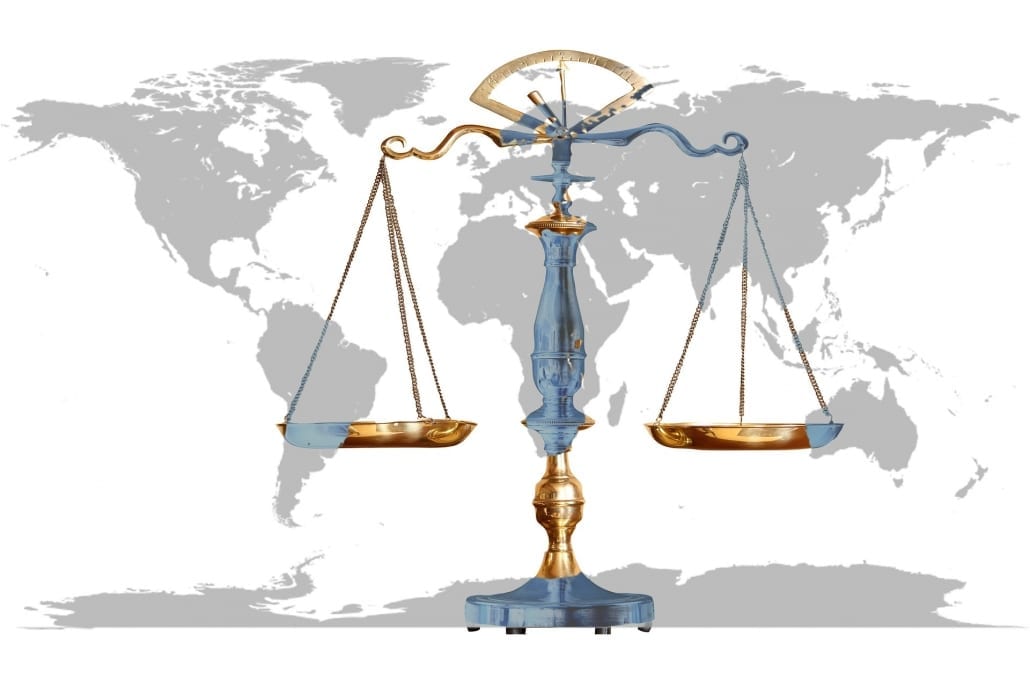
Top 10 Reasons to Read Proverbs and Teach It to Your Kids
The wisdom offered in the book of Proverbs is worth more than gold or silver. Find out how Proverbs can help your kids avoid serious mistakes and live a faithful life in God’s world.

How does God’s eternal punishment of the wicked reconcile with His love? Why does God choose to punish people in this manner? The glory of God is the answer.
The doctrine of eternal punishment has fallen into disfavor in modern Western Society at large. Even in churches the faithful attender may be hard pressed to hear a sermon on the subject. The idea is obviously uncomfortable. Eternal punishment, which is the conscious punishment of unrepentant sinners, with no chance of escape, over an eternal duration offends modern sensibilities. Rejection of such a teaching as this can be expected from those that don’t adhere to the Christian faith. However, it is tragic when so called Christians (including “theologians”) have mounted an assault against the idea that this punishment is eternal in duration.
The primary argument I wish to counter is the one that claims that eternal punishment violates the character of God. More specifically, this objection supposedly finds its roots in the teaching of Scripture itself concerning the loving nature of God. 1 John 5:1b clearly states that “God is love.” The argument is simple: if God is love, he would not condemn people to an eternity of tortuous punishment.
Two representative quotes from adherents of this view will suffice. Wilko van Holten claims, “the thought of such torment being deliberately inflicted by divine decree is totally incompatible with the idea of God as infinite love.” [1] To further support his position, van Holten quotes Clark Pinnock who agrees and offers an aggressive rebuke when he says, “Obviously, I am rejecting the traditional view of hell in part out of a sense of moral and theological revulsion to it. The idea that a conscious creature should have to undergo physical and mental torture through unending time is profoundly disturbing, and the thought that this is inflicted upon them by divine decree offends my conviction about God’s love.” [2] Thus, these scholars, and many like them, reject the teaching of eternal punishment based on moral revulsion that supposedly rests on strong theological grounds. But does the Bible agree with their conclusions?
My goal is to show that the eternal punishment of the wicked shows the multi-faceted nature of God. Rather than reducing God’s nature to the sole attribute of love and then rejecting the doctrine of eternal punishment based on this reduction,[3] I hope to show from several representative Scripture passages how God’s punishment of the wicked displays many aspects of His being which fits perfectly with His ultimate desire to glorify Himself.

Before I do so, I first wish to state several assumptions upon which my thinking rests.
I agree with Louis Berkhof who asserts,
“[God] is holy in everything that reveals Him, in His goodness and grace as well as in His justice and wrath.” [4]
– Louis Berkhof, Systematic Theology
Therefore, since “God is light, and in him there is no darkness at all” (1 John 1:5), [5] all his actions can be considered good, regardless of human opinion or evaluation. Again, my method relies on an examination of several representative passages that speak of God’s judgment and show aspects of His being demonstrated through that judgment. In the end, I hope to show that this survey of Scriptural data shows that God’s eternal punishment of the wicked displays many properties of His being which are fundamentally good and not a contradiction or violation of Himself in any way.
Though the Old Testament does not speak very often, nor in detailed terms, about the final judgment of mankind, Psalm 9 presents several data points for consideration, especially v.4-8 and 16. Here the Psalmist says,
For you have maintained my just cause; you have sat on the throne, giving righteous judgment. You have rebuked the nations; you have made the wicked perish; you have blotted out their name forever and ever. The enemy came to an end in everlasting ruins; their cities you rooted out; the very memory of them has perished. But the Lord sits enthroned forever; he has established his throne for justice, and he judges the world with righteousness; he judges the peoples with uprightness. . . . The Lord has made himself known; he has executed judgment; the wicked are snared in the work of their own hands.
– Psalm 9:4-8, 16
First, it is clear that the judgment spoken of has implications for the afterlife since the wicked are removed from God’s book of life “forever and ever” (9:5). Additionally, the final state of God’s enemies is described as “in everlasting ruins” (9:6). This judgment, although occurring within human history, has everlasting implications.
In fact, it is this judgment that the Psalmist rejoices in throughout the Psalm. Instead of recoiling in moral revulsion to the judgments of the Lord, the Psalmist pronounces them “righteous” (9:4). The Hebrew word for “righteous” (sedeq), refers to the “rightness” or “justice” of the action. The Psalmist does not see this as an unfair punishment. In fact, he blames the wicked since they are merely “snared in the work of their own hands” (9:16). The Lord is not unjust in this everlasting punishment. Instead, it is simply the just punishment for the deeds of the wicked done their lifetime.
Furthermore, the Psalmist says that it is through these judgments that “the Lord has made himself known” (9:16). The eternal punishment of the wicked is a means by which the Lord reveals himself. The throne imagery in the Psalm communicates God’s sovereign right and power to judge. This power shows itself in judging the wicked individually (seen in the punishment of their individual deeds) and the nations corporately (9:4 “you have rebuked the nations,” 9:8 “he judges the world”). The eternal nature of God is seen in the fact that he “sits enthroned forever” (9:7) which also corresponds to his everlasting judgment of the wicked.
Also, the Psalmist declares that this throne has been established for justice (9:7), once again emphasizing that God’s judgments are fair and in recompense for evil committed. This revelation of God’s justice is an important counter-argument against those who emphasize God’s love as a primary factor in their rejection of eternal punishment. As Vos warns,
“The love of God is never allowed to swallow up the attribute of His justice, as if justice were a mere instrument in the hands of love for the pursuit of its own ends.” [6]
– Geerhardus Vos, “The Scriptural Doctrine of the Love of God”
God’s love for his people means that he punishes those who unjustly afflict them. That is why the Psalmist is able to rejoice and trust in the power and righteousness of God. The evil done in this world will not go unpunished. As Herman Bavinck says, justice is an integral part of God’s sovereign rule over the universe:
“The moral order, rather than being in conflict with the order of justice, upholds, demands, and supports it. Justice is an important component of morality. Justice above all is the way in which the grace and love of God are maintained and made to triumph. Those who, with Marcion, assume that justice and grace are antithetical to each other deny the connection between the moral order and the order of justice and do not understand the majesty and glory of the law. . . . But God owes it to his covenant, to the order of justice that he himself at one time established, to his name and honor, to lead his people to salvation and to punish the wicked.” [7]
– Herman Bavinck, Reformed Dogmatics
Bavinck wisely notes that if justice is not done, God’s covenant love towards his people is violated. Thus, the doctrinal of eternal punishment does not violate God’s love. Rather, it upholds God’s love toward his covenant people at the same time displaying his justice and righteousness toward those who have done evil.
Some may object to the fact that God’s covenant people are the objects of His love in a way that the wicked are not. Why should they receive His mercy and not all?
The Apostle Paul anticipates and answers this question in Romans chapter 9. In the context of his readers possibly wondering why God has not chosen to save all of Israel, Paul deals with the principle of God’s election. At the core of election lies the attribute of God’s free will. Though modern thinkers tend to emphasize human free will as ultimate, the Bible does not, instead emphasizing God’s freedom of choice. Paul himself explicitly states that election “depends not on human will or exertion, but on God, who has mercy” (Rom. 9:16).
But it is not as though the word of God has failed. For not all who are descended from Israel belong to Israel, and not all are children of Abraham because they are his offspring, but “Through Isaac shall your offspring be named.” This means that it is not the children of the flesh who are the children of God, but the children of the promise are counted as offspring. For this is what the promise said: “About this time next year I will return, and Sarah shall have a son.” And not only so, but also when Rebekah had conceived children by one man, our forefather Isaac, though they were not yet born and had done nothing either good or bad—in order that God’s purpose of election might continue, not because of works but because of him who calls— she was told, “The older will serve the younger.” As it is written, “Jacob I loved, but Esau I hated.” What shall we say then? Is there injustice on God’s part? By no means! For he says to Moses, “I will have mercy on whom I have mercy, and I will have compassion on whom I have compassion.” So then it depends not on human will or exertion, but on God, who has mercy. For the Scripture says to Pharaoh, “For this very purpose I have raised you up, that I might show my power in you, and that my name might be proclaimed in all the earth.” So then he has mercy on whomever he wills, and he hardens whomever he wills. You will say to me then, “Why does he still find fault? For who can resist his will?” But who are you, O man, to answer back to God? Will what is molded say to its molder, “Why have you made me like this?” Has the potter no right over the clay, to make out of the same lump one vessel for honorable use and another for dishonorable use? What if God, desiring to show his wrath and to make known his power, has endured with much patience vessels of wrath prepared for destruction, in order to make known the riches of his glory for vessels of mercy, which he has prepared beforehand for glory— even us whom he has called, not from the Jews only but also from the Gentiles?
– Romans 9:6–24
The principle of God’s freedom of choice is referenced frequently in this passage. It is the seen in the selection of Jacob as an object of love rather than his twin brother Esau (9:11-13). It is demonstrated in God’s choice to use Pharaoh as an enemy over which to triumph in power (9:17). Paul further elucidates the principle of election in the potter and clay metaphor (9:21-22), the selection of some Gentiles for salvation (9:24-29), as well as the salvation of a Jewish remnant (9:27).
Additionally, it is God’s mercy in not punishing some that also reveals his free will. After analyzing Jonathan Edwards’ treatment of hell, Bruce Davidson concludes,
“Behind the idea that hell is contrary to mercy and kindness is the premise that mercy would force God not to punish to such a degree. But mercy that is forced is not free. It is therefore not mercy at all, but obligation or compulsion.” [8]
– Bruce Davidson, “Reasonable Damnation: How Jonathan Edwards Argued for the Rationality of Hell.”
Furthermore, Herman Bavinck sees God’s absolute freedom as the very basis of election and punishment. He writes, “God’s freedom was even more clearly evident in election and reprobation, for which no ground whatever can be cited, and which rests in the sovereign good pleasure of God alone.”
God’s freedom to glorify Himself whatever way He chooses is a primary reason behind the punishment of the wicked. God does whatever He wills. Thus, whether it is the judgment of the wicked or the salvation of the elect, God’s free will is as a vital aspect of His omnipotent and omniscient being. Though humans may recoil at God’s will as a basis for punishment, Bavinck asserts that we should see it as an aspect of God’s goodness. He writes:
“The world was brought into being by an act of God’s free and sovereign will, and that God had his own reasons for that will. To us a thing is good for the sole reason that God wills it. God himself can never have willed anything unless it is either good in itself or for some other reason. We can almost never tell why God willed one thing rather than another, and are therefore compelled to believe that he could just as well have willed one thing as another. But in God there is actually no such thing as choice inasmuch as it always presupposes uncertainty, doubt, and deliberation. He, however, knows what he wills—eternally, firmly, and immutably. Every hint of arbitrariness, contingency, or uncertainty is alien to his will, which is eternally determinate and unchanging.” [9]
– Herman Bavinck
Thus, God’s will is as good as He is. There is no arbitrariness or evil in His choice to punish the wicked eternally. Those who reject God’s punishment of the wicked as a violation of His character actually do violence to that very character by trampling on God’s sovereign choice.

In addition to God’s free will being on display, woven throughout Romans 9 are other references to God’s nature. God’s selection of Pharaoh as an enemy is said to be for the purpose of displaying his power (Romans 9:17). In the Egyptian religious system, Pharaoh was seen as a semi-divine son of the gods. As slaves, Israel’s condition under his rule seemed helpless until they cried out to Yahweh for deliverance. God then chose to harden Pharaoh’s heart so that he might drown the king’s army in the Red Sea. Thus, the supposed Egyptian divinities were shown as impotent in the face Yahweh’s wrath.
It is also this wrath that Paul says is seen in God’s destruction of the wicked. In the potter and clay metaphor, Paul says,
“What if God, desiring to show his wrath and make known his power, has endured with much patience vessels of wrath prepared for destruction”
– Romans 9:22
God’s wrath is His holy, righteous anger towards those who disobey Him. Though it may not be proper to consider God’s wrath as an attribute in the way love is, it does reveal a character of righteousness and holiness that responds in anger toward sin.
Finally, Romans 9:22 says that the delay of God’s wrath against the wicked displays his patience. Implied is the fact that the wicked deserve immediate punishment for their deeds. Since God delays this punishment, allowing them to keep living and to keep acting wickedly, His great patience is shown to all.
Before moving on, one final point is worth noting. Some might ask why God does not exercise His free will and simply choose to have mercy on all. If He did, two aspects of His character, freedom of will and mercy, would still be on display. In addition to what has already been said above, Augustine addresses this point succinctly. He writes,
“if all had remained condemned to the punishment entailed by just condemnation, then God’s merciful grace would not have been seen at work in anyone; on the other hand, if all had been transferred from darkness into light, the truth of God’s vengeance would not have been made evident.”[10]
– Augustine
Thus, through both the election of vessels of mercy to glory and the consignment of vessels of wrath to punishment God displays more of his character.

This is evidence of the righteous judgment of God, that you may be considered worthy of the kingdom of God, for which you are also suffering—since indeed God considers it just to repay with affliction those who afflict you, and to grant relief to you who are afflicted as well as to us, when the Lord Jesus is revealed from heaven with his mighty angels in flaming fire, inflicting vengeance on those who do not know God and on those who do not obey the gospel of our Lord Jesus. They will suffer the punishment of eternal destruction, away from the presence of the Lord and from the glory of his might, when he comes on that day to be glorified in his saints, and to be marveled at among all who have believed, because our testimony to you was believed. To this end we always pray for you, that our God may make you worthy of his calling and may fulfill every resolve for good and every work of faith by his power, so that the name of our Lord Jesus may be glorified in you, and you in him, according to the grace of our God and the Lord Jesus Christ.
– 2 Thessalonians 1:5–12
In 2 Thessalonians 1:5-12, Paul touches on many attributes of God in judgment already mentioned, along with some new information concerning the deeds of the wicked. First, Paul again emphasizes that the nature of God’s judgment on the evil is “eternal destruction” (2 Thess. 1:9).[11] The punishment will be final and forever. Once again, God’s judgment is called “righteous” (1:5).
Furthermore, Paul says that God himself considers this punishment “just” (1:6). Instead, of relying on human considerations in evaluating God’s actions, this statement reveals the divine point of view and should be taken to heart. John Frame acknowledges the trouble humans have looking at the matter from God’s perspective but offers the following explanation:
Is it unfair for God to punish people eternally? It might seem that way. How can one sin lead to an eternity of misery? But remember that, as with Adam’s first sin, each sin is an affront to the dignity of the eternal God, a violation of his perfect righteousness, a betrayal of his perfect love. Calculations of this sort go beyond our powers, but it shouldn’t surprise us to have God tell us that such sins are infinitely offensive and merit an eternal penalty. It is up to him to determine penalties, and we know from Scripture that his decisions are perfectly just. [12]
– John Frame, Systematic Theology
The key point to understanding what Frame, and the apostle Paul are saying, is that humans must shift away from evaluations that depend on their own sense of right and wrong. Moral goodness depends entirely on God’s character and actions. He is the standard of what is good and bad. Therefore, when God says his eternal judgment is just, it should be believed.
Instead of merely stating that God is right and leaving it at that, Paul provides two explanations for God’s eternal judgment of the wicked. First, they afflict the righteous (1:6). Though Paul may have in mind a limited group of antagonists persecuting the Thessalonian church, he elsewhere warns that Christians will be afflicted by the wicked (2 Tim. 3:12), suggesting a fairly widespread problem.
Second, even if some of the wicked do not directly persecute Christians, they are still held liable for disobeying the gospel (2 Thess. 1:8). God has revealed his existence to all mankind (Rom. 1:19) and given everyone a conscience to obey (Rom. 2:12-16). Therefore, they are liable to God’s judgment (Rom. 2:12). Thus, in a sense, God has given all people an opportunity to obey his righteous revelation but all have turned away and none seek him (Rom. 3:10-12). That is why God’s judgment is just. He takes vengeance on those who will not obey Him and those who afflict His people. Since God’s character is good, His vengeance is just.
Additionally, God’s vengeance implies power. No one will escape his judgment. God will exercise His power in judgment and will continue exercising that power forever. Once again, the duration of God’s powerful judgment is important. Davidson comments that this eternal aspect of the judgment was of great importance to Jonathan Edwards. He writes,
“Edwards concludes that considerations of God’s character not only make the existence of hell reasonable and just but also necessary. This is because a just and holy God ought to have an infinite hatred of sin if it is a thing infinitely horrible. And if he has such infinite hatred, he should also express that hatred in his actions toward sinners. Only an everlasting sentence could adequately manifest the infinite extent of God’s hatred for sin.” [13]
– Bruce Davidson, “Reasonable Damnation: How Jonathan Edwards Argued for the Rationality of Hell.”

As objects of wrath, the wicked will see and feel the righteous holiness of God against them forever. This holiness will also be on display for the elect. In another article on Edwards’ work, Davidson writes,
“Without hell, God’s glory would not be adequately manifested in all its dimensions. Just as the majesty of a huge waterfall appears in the thunderous destructive impact of its force on the rocks below, the grandeur of God appears as his wrath lands on his enemies in eternity.” [14]
– Bruce Davidson, “Reasonable Damnation: How Jonathan Edwards Argued for the Rationality of Hell.”
The elect, for all eternity, will see how God has vindicated them from the wicked and saved them from a punishment they too deserved.
Finally, Paul describes this eternal punishment as separation “away from the presence of the Lord and from the glory of his might” (2 Thess. 1:9). Though the elect will be with God in eternity, the damned will be cast from His presence. This separation from God implies His holiness. God cannot stand to be in the presence of sin and removes it from him. Berkhof explains it this way,
“The fundamental idea of the ethical holiness of God is also that of separation, but in this case it is separation from moral evil or sin. In virtue of His holiness God can have no communion with sin….Used in this sense, the word ‘holiness’ points to God’s majestic purity, or ethical majesty. But the idea of ethical holiness is not merely negative (separation from sin); it also has a positive content, namely, that of moral excellence, or ethical perfection.” [15]
– Louis Berkhof, Systematic Theology
Thus, for all eternity, both the wicked and the elect will see God’s majestic purity, holiness, and righteous through the ongoing punishment of the damned.

In one of the final chapters of the Bible, God’s universal assessment of all humanity is described. Once again the throne of God in 20:11 represents God’s sovereign power and right to judge. One new point not seen yet in the passages we’ve looked at is the appearance of the books in v.12. John writes,
“And I saw the dead, great and small, standing before the throne, and books were opened. Then another book was opened, which is the book of life. And the dead were judged by what was written in the books, according to what they had done.”
– Revelation 20:11
Whether these books are literal or merely symbolic, the point implied is God’s omniscience. Every deed done by all people during life is known by God and brought before him on judgment day. These deeds form the basis of God’s judgment according to Revelation 20:13.
Thus, through the eternal punishment of the wicked, God’s omniscient wisdom is seen. No deed will ever escape His watchful eye. And because God knows all deeds, He is able to judge with justice. Man receives a just penalty based on His actions. Additionally, God’s power is also seen in his ability to raise the dead to stand before Him in judgment. Not only that, His power is on display as He assigns the wicked to eternal punishment in the lake of fire as a fitting penalty for what they had done.
Many of the same attributes of God are once again seen or implied in Jesus’ famous passage on the final judgment of man. Here, Jesus himself sits on His throne as the righteous, omnipotent ruler who separates those who are His from those who are not. Such sorting implies His omniscient wisdom and power; He knows who are His and is able to consign both the elect and the condemned to their proper eternal destinies. Justice is again implied in that Jesus’ judgment is based here on what people had done in life. Those who had loved and served Him by serving his people are given an inheritance in His kingdom (Matt. 25:34) and “eternal life” (25:46). Those who did not are consigned to “the eternal fire prepared for the devil and his angels” (25:41) and “eternal punishment” (25:46).
This passage is an essential counter to those who overemphasize Jesus’ love at the expense of his role as future judge. Here, there is no sense that Jesus’ love somehow overrides, or nullifies, his righteous judgment. Vos comments,
“So long as the doctrine of eternal punishment is recognized as an integral part of our Lord’s message, it will also have to be admitted that He knows of a relation of God to man determined not by the principle of love but by that of justice.” [16]
– Geerhardus Vos
Therefore, when theologians emphasize Jesus’ love at the expense of His righteous justice, the net effect is a distortion of His character.
The final passage for analysis in this survey is Romans 2:1-11. Here, Paul argues for the universal judgment of all mankind, both Jew and Gentile. Early in the passage, Paul establishes God’s justice by saying,
“We know that the judgment of God rightly falls on those who practice such things”
– Romans 2:2
Once again we see God’s power on display by the fact that no one “will escape the judgment of God” (2:3).
One new point that Paul raises in this passage is the rejection of God’s kindness by the wicked. In Romans 2:4, Paul warns that those who persist in sin “presume on the riches of [God’s] kindness and forbearance and patience.” In fact, God’s continued kindness towards sinners is meant so that they might repent (Romans 2:4). However, the wicked refuse to do so and thus “[store] up wrath for [themselves] on the day of wrath when God’s righteous judgment will be revealed” (Romans 2:5). Thus, God’s anger is in part an outpouring against the rejection of His kindness and patience.
John Frame agrees and points out,
“in the time before the last judgment, unbelievers, even the reprobate, experience the love of God, real love….His love to the reprobate is real love, even though it leads later to wrath. God judges the wicked because they have despised his kindness (Rom. 2:4). That kindness must be real kindness if it is to be a valid ground of condemnation.” [17]
– John Frame, Systematic Theology
Therefore those that claim God’s eternal punishment somehow violates His love are missing this key point. God did show a kind of love to unrepentant sinners but they rejected it. Berkhof makes this same connection when he writes,
“[God’s] love to man is always unmerited, and when shown to sinners, is even forfeited. The Bible generally uses the word [“grace”] to denote the unmerited goodness or love of God to those who have forfeited it, and are by nature under a sentence of condemnation.” [18]
– Louis Berkhof, Systematic Theology
Those that are condemned had a real opportunity to receive God’s love but chose to continue in sin and reject him. For that, Paul once again emphasizes the justice of God’s judgment and that God “will render to each one according to his works” (Romans 2:6). In no way will the sentence of eternal punishment be unjust. Rather, Grudem observes that Scripture teaches that no one will be able to charge God with injustice:
“Scripture clearly affirms that God will be entirely just in his judgment and no one will be able to complain against him on that day….For this reason, on the last day ‘every mouth’ will be ‘stopped,’ and the whole world will be ‘held accountable to God’ (Rom. 3:19), with no one being able to complain that God has treated him or her unfairly.”[19]
– Wayne Grudem
Thus, Scripture once again reinforces God’s justice in meting out eternal punishment.
After surveying these representative Scripture passages, it is clear that the doctrine of eternal punishment reveals the multi-faceted character of God. His holiness, justice, righteousness, omniscience, omnipotence, free will, patience, kindness, and even His love are seen in the process of judging the wicked. Thus, as Vos says it is incorrect to “demand that God’s love, and nothing but His love, shall be made the keynote of every message Christianity has to bring to the world.” [20] Doing so, as Vos also says, is merely a partial truth that distorts other Christian principles, namely the character of God.[21] Rejecting eternal punishment on the basis of reducing God’s character only to love is biblically invalid.
Hopefully, more Christians will begin to recognize this error and not only reclaim, but rejoice in God’s righteous judgment of the wicked. May more become like Jonathan Edwards who Davidson says, “Far from being embarrassed about the doctrine of hell, he believed it redounded to the glory of God, and he brought it up seemingly at every opportunity. Besides using it as a motivator in his awakening sermons, Edwards developed the doctrine of hell in at least two contexts: (1) as an instrument of theophany, a mirror for manifesting the greatness of the divine Being; and (2) as the final arena for exposing human wickedness and God’s triumph over it in redemptive history.” [22]
Christians should also rejoice in this glorious doctrine now because, as Davidson also says, they will do so in all eternity “since they will see the alternative to salvation clearly before them. They will feel a profound gratitude and joy at being spared the same fate and know even more deeply that ‘there but for the grace of God go I.’” [23]
Augustine. City of God. Translated by Henry Bettenson. London: Penguin Books, 2003.
———. The Augustine Catechism. Hyde Park, NY: New City Press, 1999.
Bavinck, Herman. Reformed Dogmatics. Edited by John Bolt. 4 vols. Grand Rapids, MI: Baker Academic, 2004.
Berkhof, Louis. Systematic Theology. Grand Rapids, MI: William B. Eerdmans Publishing Company, 1932.
Brown, Harold O.J. “Will the Lost Suffer Forever?” Criswell Theological Review 4 (Spr 1990): 261-278.
Davidson, Bruce W. “Glorious Damnation: Hell as an Essential Element in the Theology of Jonathan Edwards.” Journal of the Evangelical Theological Society 54, no. 4 (Dec 2011): 809-822.
———. “Reasonable Damnation: How Jonathan Edwards Argued for the Rationality of Hell.” Journal of the Evangelical Theological Society 38, no. 1 (Mar 1995): 47-56.
Egan, Harvey S.J. “Hell: The Mystery of Eternal Love and Eternal Obduracy.” Theological Studies 75, no.1 (Mar 2014): 52-73.
Frame, John. Systematic Theology. Phillipsburg, NJ: P&R Publishing, 2013.
Grudem, Wayne. Systematic Theology. Grand Rapids, MI: Zondervan, 1994.
Quarles, Charles L. “The ’ΑΠΟ of 2 Thessalonians 1:9 and the Nature of Eternal Punishment.” The Westminster Theological Journal, no. 2 (Fall 1997): 201-211.
Sanders, John. “Raising Hell about Razing Heil: Evangelical Debates on Universal Salvation.” Perspectives in Religious Studies 40, no. 3 (Fall 2013): 267-281.
Van Holten, Wilko. “Can the Traditional View of Hell Be Defended? An Evaluation of Some Arugments for Eternal Punishment.” Anglican Theological Review 85, no. 3 (Sum 2003): 457-476.
Vos, Geerhardus. “The Scriptural Doctrine of the Love of God.” The Presbyterian and Reformed Review 13, (1902): 1-37. http://www.biblicaltheology.org/sdlg.pdf (Accessed June 25, 2015).
[1] Wilko van Holten, Can the Traditional View of Hell Be Defended? An Evaluation of Some Arugments for Eternal Punishment,” Anglican Theological Review 85, no. 3 (Sum 2003), 464.
[2] ibid, 464; Clark Pinnock, “Conditional View,” in William V. Crockett (ed.), Four Views on Hell (Grand Rapids, MI: Zondervan, 1992), 164-5.
[3] Geerhardus Vos blames Albrecht Ritschl for this reduction. Geerhardus Vos, “The Scriptural Doctrine of the Love of God.” The Presbyterian and Reformed Review 13, (1902), 2.
[4] Louis Berkhof, Systematic Theology (Grand Rapids, MI: William B. Eerdmans Publishing Company, 1932), 73.
[5] Unless otherwise noted, all Scripture quotations will be taken from the English Standard Version.
[6] Geerhardus Vos, “The Scriptural Doctrine of the Love of God”, 9.
[7] Herman Bavinck, Reformed Dogmatics. Edited by John Bolt. 4 vols. (Grand Rapids, MI: Baker Academic, 2004), 2:228.
[8] Bruce Davidson, “Reasonable Damnation: How Jonathan Edwards Argued for the Rationality of Hell.” Journal of the Evangelical Theological Society 38, no. 1 (Mar 1995), 49.
[9] Herman Bavinck, Reformed Dogmatics, 2:240.
[10] Augustine, City of God. Translated by Henry Bettenson (London: Penguin Books, 2003), 989.
[11] It is outside the scope of this paper to argue against the annihilationist interpretation of this passage.
[12] John Frame, Systematic Theology (Phillipsburg, NJ: P&R Publishing, 2013), 1083.
[13] Bruce Davidson, “Reasonable Damnation: How Jonathan Edwards Argued for the Rationality of Hell”, 51.
[14] Bruce Davidson, “Glorious Damnation: Hell as an Essential Element in the Theology of Jonathan Edwards.” Journal of the Evangelical Theological Society 54, no. 4 (Dec 2011), 809.
[15] Louis Berkhof, Systematic Theology, 73.
[16] Geerhardus Vos, “The Scriptural Doctrine of the Love of God,” 12.
[17] John Frame, Systematic Theology, 238.
[18] Louis Berkhof, Systematic Theology, 71.
[19] Wayne Grudem, Systematic Theology (Grand Rapids, MI: Zondervan, 1994), 1147.
[20] Geerhardus Vos, “The Scriptural Doctrine of the Love of God,” 1.
[21] Ibid., 1.
[22] Bruce Davidson, “Glorious Damnation: Hell as an Essential Element in the Theology of Jonathan Edwards,” 810.
[23] Bruce Davidson, “Reasonable Damnation: How Jonathan Edwards Argued for the Rationality of Hell,” 53.

Jim is Founder, Editor, and Author at 4Elect. He holds a Master of Arts in Theological Studies from Reformed Theological Seminary. Jim rejoices that God chooses insignificant people to bring glory to Himself.

The wisdom offered in the book of Proverbs is worth more than gold or silver. Find out how Proverbs can help your kids avoid serious mistakes and live a faithful life in God’s world.

The most important relationship in your life is your relationship with God. No other relationship comes close. Grow in knowing and loving Him.

If you are at a loss of what to pray for, here’s a solution – simply open your Bible for an endless source of ideas. Here’s how to do it.

Prayer can be hard work. Most Christians are probably not happy with their prayer life and know they need to improve. Here are some helps identifying problems and how to make prayer easier.
Unless otherwise indicated, Scripture quotations are from The ESV® Bible (The Holy Bible, English Standard Version®), copyright © 2001 by Crossway, a publishing ministry of Good News Publishers. Used by permission. All rights reserved.
Third-Party Content4Elect does not necessarily endorse every idea or comment in a video or article or quote created by a third party author, minister, etc.. Additionally, if we post one piece of material by an author or speaker, it certainly does not mean we endorse all content ever produced, or words spoken by, that particular individual. We post third party content that we believe is overall spiritually beneficial to our readers. We screen all third party content for suitability.